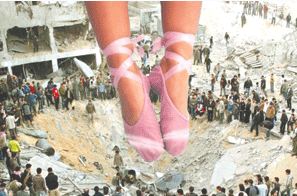 Luminato is featuring the Batsheva Dance Company from Israel in this year's festival. Below is a letter protesting this programming choice from a number of groups supporting Palestinian human rights.
Luminato is featuring the Batsheva Dance Company from Israel in this year's festival. Below is a letter protesting this programming choice from a number of groups supporting Palestinian human rights.June 13, 2012
Dear Luminato Board Members,
As supporters of the growing global campaign for Palestinian human rights we are writing to express our concern that you have chosen to feature the Batsheva Dance Company in this year's Luminato Festival. Our concern stems from Israel's strategy of using the arts as a way to distract attention from its oppression of Palestinians. Intentionally or not, by entering into collaboration with this Israeli state-sponsored organization, Luminato is complicit in Israel's strategy to whitewash its image (1). The reality behind this image is a country that oppresses the Palestinian people on a daily basis through occupation, colonization and apartheid policies and practices. In the past year alone, this has included:
Ethnic Displacement Policies: 222 Palestinian homes in the West Bank and East Jerusalem demolished by Israel, displacing 1094 people including 609 children under the age of 18.
Military killings: 115 Palestinians killed by Israeli forces in 2011, a full three years after the Israeli assault on Gaza in 2008-09 when Israeli forces killed 1400 Palestinians.
Imprisonment and Collective Punishment: 4437 Palestinians currently being held in Israeli prisons, including 302 being held without trial in Administrative Detention.
Increased Illegal Settlement Activity: Approval for construction of 1,100 settlement homes in September, 2011 and approval of three settlement outposts this past April. Even though the Secretary General of the United Nations has reiterated that "all settlement activity is illegal under international law," Israel last week promised 851 new homes for West Bank settlers.
It is precisely ugly facts like these that Israel aims to keep out of the spotlight by deflecting attention to its cultural products at international venues. In 2009, Arye Mekel of Israel's Minister of Foreign Affairs (MFA) told a reporter, "We will send well-known novelists and writers overseas, theater companies, exhibits . . . This way you show Israel's prettier face, so we are not thought of purely in the context of war." You may claim that art and politics can be separated, but the Israeli Ministry of Foreign Affairs knows this is not the case when it refers to Batsheva as "the best known global ambassador of Israeli culture."
As is widely known, Batsheva has long received funding from the Ministry of Foreign Affairs. Perhaps this fact helps explain why Batsheva began "Dancing on Gaza's Graves" with a tour that started shortly after Israel's massacre of almost 1400 Palestinians during the 2008 - 2009 "Operation Cast Lead". Indeed, just ten days into the aftermath of Israel's bombs and white phosphorous on Gaza, Batsheva Dance Company began dancing its way across fourteen cities in the United States and Canada. One might have expected a more creative response from artists in the face of such extreme brutality, especially from those who claim to care for human rights. Batsheva's artistic director Ohad Naharin stated in a 2005 interview for example, that "I continue to do my work, while 20 km from me people are participating in war crimes." Despite this individual acknowledgement of Palestinians' oppression, Batsheva as an institution did not even issue a statement condemning its government's massacre of Palestinians in Gaza.
Similarly, Luminato's decision to commission the Batsheva Dance Company does not meet expectations set by the Festival's 2012 banner ideal of "Revolution and Transformation". Far from transformative, the roster of collaborations you have entered into around the Batsheva program suggests more status quo ties to a state which has a long and continuing history of ethnic cleansing and systematic and brutal oppression of the original inhabitants of Israel, Gaza and the West Bank. Accepting support from the Israeli Consulate General in Toronto makes this point clearly enough. So too does your decision to enter into collaboration with Jerusalem's Israel Festival, which is amongst a growing number of Israeli-state sponsored cultural venues being protested by Israeli citizens themselves. Just last year, the Israeli Boycott From Within! movement called upon the participants of the Israel Festival to heed the 2005 Palestinian call for boycott, divestment and sanctions.
By collaborating with Israeli state sponsored organisations Luminato is effectively taking sides in the Israel Palestinian conflict. You have other options. We call on Luminato not to be complicit in Israel's strategy of using art and culture to deflect attention from its occupation, colonisation and apartheid policies.
Sincerely,
Coalition Against Israeli Apartheid (CAIA)
Canadian Arab Federation (CAF)
Independent Jewish Voices (IJV), Toronto
International Jewish Anti-Zionist Network (IJAN), Canada
Not In Our Name: Jewish Voices Opposing Zionism (NION)
Palestine House Educational and Cultural Centre
Women in Solidarity with Palestine (WSP)
